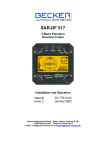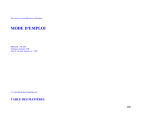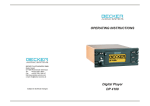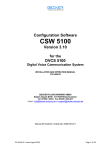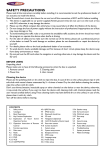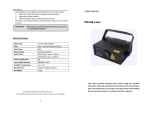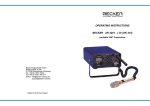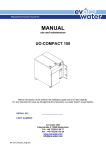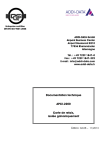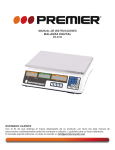Download OPERATING INSTRUCTIONS VHF Transceiver AR 3209
Transcript
OPERATING INSTRUCTIONS VHF Transceiver AR 3209 BECKER FLUGFUNKWERK GMBH Baden Airpark D-77836 Rheinmünster (Germany) Tel.: +49 (0) 7229 / 305-0 Fax: +49 (0) 7229 / 305-217 Subject to technical changes © Copyright bei Becker Flugfunkwerk Issue 10/95 Article-No. 891.436-071 Operating Instructions Becker Flugfunkwerk GmbH Baden Airpark, Gebäude B 108 77836 Rheinmünster (Germany) Becker AR 3209 Fault description TABLE OF CONTENTS IMPORTANT 1 INTRODUCTION 1 Unit type : Serial number : Aircraft type : Brief description of the fault : ................................................................................................................. ................................................................................................................. ................................................................................................................. ................................................................................................................. SAFETY INFORMATION 3 GENERAL INFORMATION 5 CONTROLS AND INDICATORS 6 OPERATING INSTRUCTIONS 8 p Switching on the unit 8 Should the fault only occur sporadically, please answer the following questions : p Transmit/receive mode 9 p Operation of intercom mode 10 p p p p p p p Audio auxiliary input Jamming of transmit button Operation of the various modes Modes Mode 1 Mode 2 Mode 3 (Displays of fixed frequencies in the various channels) Service mode (equipment configurations) Calling up the service mode Setting the squelch threshold Setting the sidetone level Setting the audio auxiliary level Setting the IC level Release the frequency setting (channel selection only) Release the frequency storage 11 11 12 12 13 15 16 Tel. +49 (0) 7229 / 305-0 Fax +49 (0) 7229 / 305-217 The fault occurs after . . . . . minutes of operation. The fault occurs under the following environmental conditions : p low temperature p high temperature p high humidity p vibration The fault is engine speed-dependent and occurs above/below . . . . . . . . rpm. Should any problems arise, I may be contacted under the following adress : .................................................................. I am available between 8 a.m. .................................................................. and 4 p.m. under the following .................................................................. telephone number : .............................................................. office: .................................. ................................................................private : ................................... Page 32 Issue 10/95 p p p p p p p p Issue 10/95 17 19 20 20 21 21 22 22 Page 1 Operating Instructions Becker AR 3209 p Erase stored frequencies 23 p Entry of password to interlock the equipment configuration 23 p Setting the dynamic mike input sensitivity 24 p Inhibiting the transmit mode for one or more memory channel 25 p Squelch fast mode 25 p Indication the software version and change status 26 p Ending of the service mode 26 TECHNICAL DATA 27 p 28 REPAIR INSTRUCTIONS If an equipment fault the unit may be sent to a Becker Dealer or the Becker customer service together with a description of the fault. The completed fault description shortens the repair times and hence lowers the resultant costs. These operating instructions do not replace the equipment manuals listed below. r General data AR 3209 - (09) / AR 3209 - (11) REPAIR INSTRUCTIONS 29 p 29 Equipment manuals Page 2 Issue 10/95 Equipment manuals to be purchased from the manufacturer or Becker Dealer : Installation and Operation DV 37501.03, Article No.: 892.531-071 Maintenance and Repair DV 37501.04, Article No.: 892.548-071 Issue 10/95 Page 31 Operating Instructions r Becker AR 3209 IMPORTANT General data AR 3209 - (09) / AR 3209 - (11) Frequency range 118.000 MHz to 136.975 MHz Number of channels 760 Channel spacing 25 kHz Operating temperature range - 20° C to + 55° C Dimensions Carefully read these operating instructions right through before attempting to operate the VHF transceiver. Keep these operating instructions carefully. They contain important safety and operating instructions for the VHF transceiver. INTRODUCTION 146 mm x 47.5 mm 194 mm Thank you for purchasing the BECKER VHF transceiver. The VHF transceiver can be installed in the instrument panel or centre console or operating console and is easy to operate. The technology used is to the state of the art. - AR 3209 - (09) - AR 3209 - (11) 1 kg 1.2 kg Fuse internal 5A To fully utilise the capabilities of your VHF transceiver, please carefully read these operating instructions right through before you start operating the set. Front panel Depth of unit without cable connector Weight If you have any questions regarding the operation of the VHF transceiver, please get in touch with your nearest Becker Dealer or with the Becker Customer Service.with your nearest Becker Dealer or with the Becker Customer Service. Page 30 Issue 10/95 Issue 10/95 Page 3 Operating Instructions Becker AR 3209 The CAUTION, WARNING and NOTE highlights have the following meanings : WARNING Failure to comply, or incorrect compliance, with these instructions or procedures can lead to injuries or fatal accidents. CAUTION Failure to comply, or incorrect compliance, with these instructions or procedures can lead to damage to equipment. NOTE Feature to which attention should be drawn. Technical Data Power supply voltage AR 3209 - (09) Nominal supply voltage Supply voltage range Emergency operation (10.0 V) 13.75 V DC 12.4 V to 15.1 V Good intercom Power consumption without panel lighting “Standby” reception mode Reception mode Transmission mode £ 70 mA £ 500 mA £ 2.5 A Panel lighting 1 A at 5 V DC 400 mA at 13.75 V DC Power supply voltage AR 3209 - (11) Nominal supply voltage Supply voltage range Emergency operation (10.0 V) CAUTION l Never connect the VHF transceiver to alternating current voltage or to voltage sources exceeding 32 V DC. l Never connect the VHF transceiver with reversed polarity to a voltage source. l The installation or use of the VHF transceiver in ambient temperatures below -20° C or above +55° C is to be avoided. l Page 4 Switch off the unit when starting or shutting down engines. Issue 10/95 13.75 V DC 12.4 V to 15.1 V Good intercom or Nominal supply voltage Supply voltage range Emergency operation (20.0 V) 27.5 V DC 24.8 V to 30.3 V Good intercom Power consumption without panel lighting “Standby” reception mode Reception mode Transmission mode £ 70 mA £ 500 mA £ 2.5 A Panel lighting 1 A at 5 V DC 400 mA at 13.75 V DC 200 mA at 27.5 V DC Issue 10/95 Page 29 Operating Instructions r Becker AR 3209 SAFETY INFORMATION Speaker muting switch ON/OFF l A speech test is to be performed before startup and it should be noted that if the speech test is carried out close to the ground station the results may be positive even if the antenna cable is broken or short-circuited. At a distance of 5 to 10 km no connection will be made. l Use a loud voice for speech communication and hold the microphone close to the lips. Otherwise cabin noise can be intrusive and make understanding difficult. l Use only microphones or headsets which are suitable for use in aircraft. In aircraft made of wood or synthetic materials or in gliders or helicopters, incoming radiation on the equipment antenna can affect the integrated amplifier of the microphone (feedback). This is noticeable in the ground station by whistling and/or heavy distortion. The described disturbances can occur in different ways on the different transmission channels. l Transmit buttons can stick and cause continuous transmission. Therefore, when transmitting ensure that the green LED disappears when the transmission button is released. Call up function SF 12 using the MDE key. The following displays appears : Top line Bottom line OFF = On = SF12 OFF or On Speaker muting on Speaker always switched on Select the function using the kHz switch. Store the required function by pressing the STO key. This selection becomes active after ending the service mode. r Indication the software version and change status Call up function SF 13 using the MDE key (4). The following displays appear : left LC display (7) right LC display (8) r Software version and change status : Microprocessor Software version and change status : CO-Miroprocessor (PIC) Ending of the service mode The VHF transceiver must be switched off to end the service mode. Page 28 Issue 10/95 Issue 10/95 Page 5 Operating Instructions Becker AR 3209 r Inhibiting the transmit mode for one or more memory channel Call up function SF 10 using the MDE key (4). The following displays appear : left LC display (7) right LC display (8) SF 10 CH channel number Using the kHz (10) (steps of 1) or MHz (9) (steps of 10) switch, select the desired channel for inhibiting the transmit mode. Store the channel by pressing the STO key (3). Several channels can be selected on priority channels. When the STO key (3) is pressed again, the inhibiting transmit mode is canceled. r Blank FSqL no function Page 6 Issue 10/95 Issue 10/95 Page 27 Operating Instructions Becker AR 3209 Set any 4-digit numerical code using the kHz (10) (steps of 1) or MHz (9) (steps of 10) switch. Store the numerical code by pressing the STO key (3). NOTE As soon as a password is given a 0 appears in the bottom line when the service mode is called up. The numerical code must then be input using the MHz (9) or kHz switch (10) and press the STO key. If the VHF transceiver detects a false numerical code, it automatically switches to the last mode. If the password is to be erased or changed, this is done by calling up the service mode using the old password. The SF 15 function is then chosen and either a 0 is entered everywhere or the changed numerical code is entered. r GENERAL INFORMATION The VHF transceiver AR 3209 enables voice communication on 760 channels in the 118.000 MHz to 136.975 MHz range with a channel spacing of 25 kHz. It complies with the requirements of ICAO Annex 10 valid from 01.01.1995. The VHF transceiver is designed with sufficient mechanical strength to enable it to be fitted in an aircraft without any limitations. There is no restriction within the verified environmental classes on fitting in the instrument panel or centre console or operating console, or fixed mounting in the fuselage, of all types of aircraft including helicopter. Setting the dynamic mike input sensitivity Call up function SF 9 using the MDE key (4). The following displays appear : left LC display (7) right LC display (8) SF 9 00 bis 63 Standard value 32 (LO sensitivity HI) The dynamic mike input sensitivity can be changed upwards or downwards using using the kHz (10) (steps of 1) or MHz (9) (steps of 10) switch. The set value is stored by pressing the STO key (3). Page 26 Issue 10/95 Issue 10/95 Page 7 Operating Instructions Becker AR 3209 CONTROLS AND INDICATORS 7 5 6 8 OFF = The storage of frequencies in the individual channels is not possible. The VHF transceiver can only work on the set frequency. ON = Storage of frequencies in the individual channels is possible (standard setting) r Erase stored frequencies Call up function SF 7 using the MDE key (4). The following displays appear : left LC display (7) right LC display (8) 1 2 3 4 9 10 Function of controls and indicators 1 ON/OFF rotary switch SF 7 CH channel number Select the channel to be erased using the kHz (10) (steps of 1) or MHz (9) (steps of 10) switch. The stored frequency is erased by pressing the STO key (3). The channel No. 1 cannot erased. r Entry of password to interlock the equipment configuration Adjustment of volume. 2 Squelch key Switching the squelch on or off. Call up the COdE function using the MDE key (4). The following displays appear : 3 Store key Storage of set frequency or other settings. left LC display (7) right LC display (8) 4 Function key Selection of mode. Page 8 Issue 10/95 Issue 10/95 COdE 0 Page 25 Operating Instructions r Becker AR 3209 Release the frequency setting (channel selection only) 5 Exchange key Mode 2: Exchange of preset frequency and active frequency. 6 LE diode, green Transmit indication (PTT button pressed). 7 LC display Indication of active transmission/ reception frequency (active frequency). 8 LC display Indication of preset transmission/ reception frequency (preset frequency). Call up function SF 5 using the MDE key (4). The following displays appear : left LC display (7) right LC display (8) SF 5 ON or OFF Select the required function using the kHz switch (10) and store the function by pressing the STO key (3). OFF = Frequency setting not possible. The VHF transceiver can only work on the frequencies stored in the individual channels. ON = Frequency setting possible (standard setting). r CH indication steady : Indicates the storage channel. CH indication flashes : If the initiated storage operation is not completed by pressing the store key. Release the frequency storage Call up function SF 6 using the MDE key (4). The following displays appear : left LC display (7) right LC display (8) SF 6 ON or OFF Select the required function using the kHz switch (10) and store the selection by pressing the STO key (3). Page 24 Issue 10/95 9 Frequency selector switch Switching the indicated switch frequency in 1 MHz steps or the storage channel upwards or downwards in steps of 10. 10 Frequency selector switch Switches the indicated switch frequency in 25 kHz steps or the storage channel by 1 step in each case upwards or downwards, without carry over. Issue 10/95 Page 9 Operating Instructions Becker AR 3209 OPERATING INSTRUCTIONS r r Setting the audio auxiliary level Switching on the unit Call up the AU function using the MDE key (4). The following displays appear : CAUTION Do not switch on the VHF transceiver when engines are being started or shut down. Switch on the VHF transceiver using the ON/OFF rotary switch (1) (rotate volume control clockwise). Both LC displays (7, 8) must show the numbers 188.88 flashing (unit test approximately 2 seconds). left LC display (7) right LC display (8) AU 00 to 63 Standard value 63 (LO level HI) Using the MHz switch (9) the audio auxiliary level can be altered upwards or downwards in steps of 10 and using the kHz switch (10), you can be altered upwards or downwards in steps of 1. The set value is stored by pressing the STO key (3). If the test is positive, the transceiver automatically switches to the mode which was selected before switch-off. r If the test is negative, the LC display (7) flashes for approximately 5 seconds. A fault report can be called up by pressing the store key. After approximately 5 seconds the transceiver automatically switches to the mode which was selected before switch-off. The fault report in the display can be interrupted by pressing the STO key (3). Setting the IC level Call up the IC function using the MDE key (4). The following displays appear : left LC display (7) right LC display (8) IC 00 to 63 Standard value 32 (LO level HI) The following fault signals are possible : Using the MHz switch (9) the IC level can be altered upwards or downwards in steps of 10 and using the kHz switch (10), you can be altered upwards or downwards in steps of 1. The set value is stored by pressing the STO key (3). l E1 Processor defective l E2 Synthesizer failed l E3 Fault in EE-PROM l E4 Controller (PIC) audio assembly defective Page 10 Issue 10/95 Issue 10/95 Page 23 Operating Instructions r Becker AR 3209 Setting the squelch threshold If function SqL is called up, the following displays appear : left LC display (7) right LC display (8) sensitivity SqL 00 to 200 (HI < -> LO) Standard value 100 Using the MHz switch (9) the squelch threshold can be altered upwards or downwards in steps of 10 and using the kHz switch (10), you can be altered upwards or downwards in steps of 5. The set value is stored by pressing the STO key (3). r Setting the sidetone level Call up the SIdE function using the MDE key (4). The following displays appear : left LC display (7) right LC display (8) SF 2 00 to 63 Standard value 32 (LO level HI) Using the MHz switch (9) the sidetone level can be altered upwards or downwards in steps of 10 and using the kHz switch (10), you can be altered upwards or downwards in steps of 1. The set value is stored by pressing the STO key (3). Page 22 Issue 10/95 The various modes are comprehensively described, toghether with the setting of the equipment configuration in the service mode, in the Annex to the General Operating Instructions. r Transmit/receive mode Set the frequency of the local ground station in the preset display and press the exchange key (5). Rotate the VOL control (1) to the centre position. NOTE If the error message E2 appears in the left indication during operation, the synthesizer is not latching and further R/T operation is no longer possible. The VHF transceiver must be checked in the next service station. Operate the transmit button and call the ground station. Hold the microphone close to the lips for optimum speech transmission. NOTES The green LED (6) indicates transmit mode. During transmission a protective circuit prevents a frequency change or frequency channel change even if the frequency selector switch (9, 10) is rotated. The keying functions on the control panel are also inhibited. Where there is acoustic feedback during transmission the side tone volume on the VHF transceiver must be turned down (refer to Service Mode for adjustment). Issue 10/95 Page 11 Operating Instructions Becker AR 3209 Set the correct reception volume using the VOL control (1) whilst the ground station is answering. Switch on the squelch (2) (press SQL key again). Weak reception signals and reception noises are suppressed. The switch-on threshold of the squelch can be set in the service mode. r Calling up the service mode Switch off the VHF transceiver. Hold the MDE key (4) pressed and at the same time switch on the unit. The VHF transceiver switches to the service mode without a unit test. SqL appears in the left LC display (7) and the switch on threshold of the squelch is shown on the right LC display (8). NOTES NOTES When changing the mode or the frequencies (PRESET-ACTIVE frequency) the change is automatically stored 2 seconds after the last change took place. Due to this delay changes which were made immediately before switching off the transceiver will not be memorized. Exception: Memory actions are stored by pressing the STO key (3). r l The settings SqL to Spec. no.: are selected in steps by briefly pressing the MDE key (4) in the service mode. If the MDE key (4) is pressed at the end of the setting Spec. no.:, the setting SqL then appears. If a direct return to the SqL setting is required the MDE key (4) must be pressed for at least one second. l In the service mode the VHF transceiver operates independently of the settings on the control panel, on the frequency which was last set as the active frequency. l The user can interlock his equipment configuration settings with the aid of a password. The VHF transceiver is delivered from the factory without a password. Section COdE “Entry of password for interlocking the equipment configuration” describes how to enter a password. Operation of intercom mode Switch on the IC switch (external). Operate the intercommunication (IC). If necessary, the IC volume can be adjusted to the noise level of the aircraft (for adjustment refer to service mode). Page 12 Issue 10/95 Issue 10/95 Page 21 Operating Instructions Becker AR 3209 r SF7 Erasure of stored frequencies COdE Entering a password to interlock the equipment configuration Dynamic mike input sensitivity Inhibiting the transmit mode for one or more memory channel no function Speaker muting switch ON/OFF Indication the software version and change status SF9 SF10 FSqL SF 12 —.— Audio auxiliary input A second and third radio unit (navigational receiver) can be monitored simultaneously via the Audio auxiliary input. During transmission the auxiliary input is switched off from the Audio end amplifier. If necessary, the input sensitivity can be matched to the noise level of the aircraft (for setting refer to service mode). r Jamming of transmit button NOTE The standard values for the equipment configuration SqL, SIdE, AU, IC and SF9 are stored in the EE-PROM. If reversion to the standard values is required, the portable VHF transceiver must be switched off and switched on again by simultaneously pressing the STO (3) and MDE (4) keys. The VHF transceiver is fitted with a protective circuit to protect against jamming of the transmit button or a short circuit on the key supply line. For continuous transmissions exceeding two minutes the protective circuit automatically switches from transmission to reception. This avoids the switched channel being blocked. It is possible to activate the transmitter again immediately by re-pressing the transmit button. In the event of a fault, this is only possible after the short circuit has been cleared or the transmit button released. CAUTION In Stock to be able to continue transmitting even with the transmit button jammed, the VHF Transceiver must be switched off and then back on again. After that the VHF transceiver then continues to operate in the transmit mode for a further two minutes. Page 20 Issue 10/95 Issue 10/95 Page 13 Operating Instructions Becker AR 3209 Operation of the various modes The VHF transceiver performs various functions which are covered by individual operating modes. The mode is selected by briefly pressing the MDE key (4). r 1 2 3 4 Modes In mode 3 (channel selection mode) the actuelly memoried frequency in the left display (7) becomes active frequency Note It is not possible to erease memory channel 1, channel 1 only can be over-written. Leaving the mode Indication of active frequency in the left LC display (7). The right LC display (8) is switched off. The active frequency can be directly changed using the frequency selector switches (9, 10). Frequencies can also be stored in the individual storage channels. Indication of active and preset frequencies. The preset frequency can be set using the frequency selector switches (9, 10). When the exchange key (5) is pressed the active and preset frequencies are interchanged. Further activation of the key reverses the frequency change. Frequencies can also be stored in the individual storage channels. Press the MDE key (4) to leave the mode 3. r Service mode (equipment configurations) Note The service mode is meant to enable the ground technicians to set the equipment configuration and must not be used in flight. The following settings can be changed or set : SqL Setting the switch-on threshold of the squelch SIdE Setting the sidetone volume Display of the storage frequencies in the storage channels and storing frequencies in the storage channels. AU Setting the audio auxiliary volume IC Setting the IC volume Service mode, for setting the equipment configuration. SF5 Inhibiting the frequency setting (channel selection only) (ON/OFF) SF6 Inhibiting the frequency storage (ON/OFF) Page 14 Issue 10/95 Issue 10/95 Page 19 Operating Instructions r Becker AR 3209 Mode 3 (Displays of fixed frequencies in the various channels) NOTE When changing the mode or the frequencies (PRESET-ACTIVE frequency) the change is automatically stored 2 seconds after the last change took place. Due to this delay changes which were made immediately before switching off the transceiver will not be memorized. Exception: Memory actions are stored by pressing the STO key (3). Channel selection mode Select the mode using the MDE key (4). The last indicated storage channel appears in the right LC display (8) and the stored frequency in the left LC display (7). The VHF transceiver is ready to transmit and receive on this frequency. r Mode 1 Standard mode Select the required channel using the kHz frequency selector switch (10) (steps of 1) or MHz frequency selector switch (9) (steps of 10). The left LC display (7) indicateds the active frequency. The right LC display (8) is switched off. NOTE The VHF transceiver is always ready to transmit and receive on the frequency shown in the left “ACTIVE” display. The active frequency can be changed with the MHz and kHz frequency selector switches (9, 10). Storage process Pressing the STO key (3) activates a storage process as described in Mode 1 (with a slight change). In Modes 1 and 2 the frequency shown in the left LC display (7) remains active regardless of the storage process. Page 18 Issue 10/95 Storage operation Press STO key (3). The active frequency remains displayed in the left LC display (7), the VHF transceiver is ready to transmit and receive on this frequency. The active frequency appears flashing in the right LC display (8). Issue 10/95 Page 15 Operating Instructions Becker AR 3209 The required frequency can be set using the kHz frequency selector switch (10) and MHz frequency selector switch (9). Press STO key (3). The next free channel is shown flashing “ch”. Press the STO key (3). The selected frequency is stored in the free speaker channel and the storage process is ended. A no memory channel is free, the highest assign memory channel is selected automatically or select the channel to be overwritten using the kHz frequency selector switch (10) and press the STO key (3). This means that this channel will be overwritten with the new frequency and the storage process ended. NOTE If no input takes place within approximately seven seconds, the VHF transceiver switches to the previously set mode. r Mode 2 Select mode 2 using the MDE key (4). The last indicated active and preset frequencies in each case are displayed in the right (8) and left (7) LC displays. The preset frequency (right LC display (8)) is set using the MHz and kHz frequency selector switches (9, 10). Press the Exchange key (5) to effect an exchange from the active to the preset frequency. Further activation of the key reverses the frequency change. Leaving the mode To leave the mode, press the MDE key (4). Storage process Pressing the STO key (3) activates a storage operation as described in Mode 1. The preset frequency appears flashing in the right hand LCD. Leaving the mode Press the MDE key (4) to leave the mode. Page 16 Issue 10/95 Issue 10/95 Page 17



















